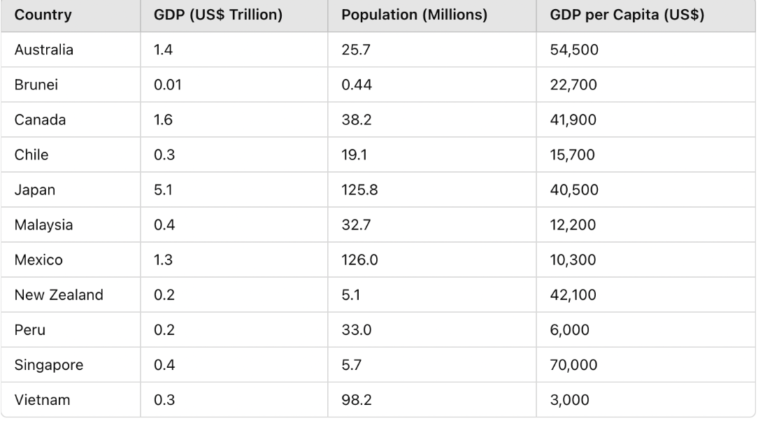The United Kingdom has recently taken a significant step in reshaping its global trade relationships by joining the Comprehensive and Progressive Agreement for Trans-Pacific Partnership (CPTPP). This milestone marks the UK as the first European country to join this expansive trade pact, which covers 11 original member nations across the Asia-Pacific region and Latin America, including Japan, Canada, Australia, and Mexico. The agreement took effect on December 15th 2024 with the UK trading with Brunei, Chile, Japan, Malaysia, New Zealand, Peru, Singapore, and Vietnam. Additionally, on 24th December 2024 the UK will begin trading with Australia and 60 days after Canada and Mexico ratify the UK’s membership and will begin trading with Canada and Mexico.
What is the CPTPP?
The CPTPP is one of the world’s largest free trade areas, representing nearly 15% of global GDP and a combined market of almost 521 million people. The agreement is designed to promote economic integration by removing trade barriers, reducing tariffs, and establishing common standards for sectors such as digital trade, intellectual property, and sustainable development. For the UK, CPTPP membership symbolises a pivot toward the high-growth economies of the Indo-Pacific, a strategic move post-Brexit to build on trade relationships beyond the European Union.
The Comprehensive and Progressive Agreement for Trans-Pacific Partnership (CPTPP) encompasses a diverse group of economies across the Asia-Pacific region and Latin America. Here are key economic indicators for each member country:

Combined GDP: Approximately US$12.1 trillion, accounting for about 11.4% of global GDP.
Total Population: Around 521 million people, representing 6.5% of the world’s population.
Trade Volume: The CPTPP region is a major hub for international trade, with member countries engaging in substantial two-way trade flows. For instance, Australia’s two-way trade with CPTPP nations was valued at A$285.1 billion, constituting 22.9% of its total trade.
Key Features of the UK’s Membership
Once the agreement is in effect, more than 99% of UK goods exports to CPTPP members will become tariff-free. This opens up opportunities for UK industries such as automotive manufacturing, food and beverage, and financial services. For example, UK car manufacturers exporting to Japan will benefit from reduced tariffs, while the food and drink sector can capitalise on growing demand in Asia-Pacific markets for premium products like Scotch whisky and pork.
Additionally, the CPTPP provides enhanced market access for services, a critical area for the UK economy. With robust provisions for digital trade, intellectual property, and professional services, UK businesses are positioned to expand in sectors like technology, finance, and legal consultancy.
Impact on UK Businesses
Boost to Exports: The elimination of tariffs across diverse industries is expected to stimulate export growth. Companies with strong footholds in CPTPP markets, such as those in automotive and agriculture, are likely to see immediate benefits.
SME Opportunities: Small and medium-sized enterprises (SMEs), which make up a significant portion of the UK economy, stand to gain easier access to new markets through streamlined rules and reduced trade barriers.
Diverse Supply Chains: By deepening ties with the Asia-Pacific, UK businesses can mitigate risks associated with supply chain disruptions. For instance, sourcing inputs from CPTPP countries becomes more cost-effective under the agreement’s rules of origin provisions.
Long-term Competitiveness: Membership also fosters innovation by aligning the UK with advanced economies in the region. Access to the dynamic Asia-Pacific market positions UK businesses to tap into future growth opportunities.
Businesses Set to Benefit
The CPTPP’s provisions create significant opportunities for industries with strong export potential. The automotive sector, for instance, will benefit from reduced tariffs, particularly in markets like Japan and Canada. High-quality food and beverage producers, such as those in the Scotch whisky and dairy sectors, will also gain from increased market access and the elimination of duties. Additionally, technology firms and financial service providers will find it easier to operate in CPTPP countries due to agreements on digital trade and intellectual property protection. Creative industries, including media and entertainment, stand to expand as the agreement fosters cross-border services and collaborative ventures.
Meanwhile, small and medium-sized enterprises (SMEs) are likely to experience a significant boost, as the CPTPP’s streamlined processes reduce administrative burdens and enable easier entry into new markets. This aligns with the UK’s broader economic goals of empowering SMEs to scale globally.
Challenges and Criticisms
Despite its advantages, the CPTPP also brings challenges. Concerns about competition from lower-cost imports could affect domestic industries, particularly in agriculture. Farmers fear being undercut by imports from countries with lower production costs and differing regulatory standards. The deal’s rules of origin provisions, while advantageous for supply chains, may also create complexities for businesses that rely heavily on EU inputs.
Moreover, critics argue that the economic gains from CPTPP membership might not compensate for the trade losses incurred from Brexit, given the EU’s geographic proximity and historical trade volumes. Environmental groups have raised concerns about the agreement’s potential to weaken environmental and labor protections, as some CPTPP members have less stringent standards. These issues underscore the importance of monitoring and addressing the agreement’s broader implications.
View from Bridgehead
By joining CPTPP, one of the world’s most dynamic free trade blocs, the UK reinforces its commitment to rules-based trade while diversifying economic partnerships across the fast-growing Asia-Pacific region. Although the projected GDP uplift of only 0.08% may appear modest initially, the CPTPP should be viewed as a long-term investment in global trade integration, unlocking significant opportunities for UK businesses in services, digital trade, and advanced manufacturing and vice-versa. With services comprising approximately 80% of the UK economy, the CPTPP’s robust provisions for cross-border trade in services, including professional services and financial technology, align well with the UK’s strengths. This agreement helps position the UK at the forefront of shaping future global trade standards, strengthening economic resilience amid geopolitical shifts, and embedding itself in growth-driven markets. Beyond immediate positives, the CPTPP signals the UK’s ambition to lead in a reimagined global trade landscape, fostering innovation and competitiveness and from Bridgehead’s perspective builds further on our commitment in opening our office in Australia to help develop local two-way relationships and partnerships across the region.
Conclusion
Joining the CPTPP represents a bold step in the UK’s post-Brexit strategy to establish itself as a global trading powerhouse. By aligning with some of the fastest-growing economies, the UK has opened new avenues for businesses to expand and innovate. While challenges remain, the agreement’s long-term potential to boost trade, diversify markets, and enhance competitiveness signals a promising future for UK industries in the global economy.






